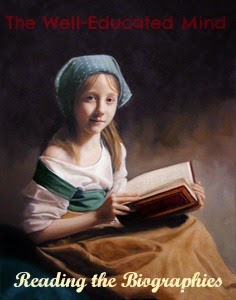Oh, Montaigne! The more of his essays that I read, the more I like him. He’s inquisitive, does not let anything get in the way of giving his opinion on absolutely any subject, has a clever but disordered mind, and because of the last point, really makes you engage your brain as you read. I would have loved to meet him in real life, but, I get the impression that we’d probably have occasionally annoyed each other.
Some of the readings for this section were:
On The Vanity of Words: After reading Montaigne’s essay On Education, I suppose this attack on rhetoricians can’t come as much of a surprise. To be eloquent is to foster a type of deception, and Montaigne is scathing in his condemnation of it.
 |
| Cicero & the magistrates disovering the tomb of Archimedes Benjamin West source Wikiart |
On the Inconsistancy of Our Actions: This one is very interesting. Montaigne laments the inconsistency of men, stating that instead of following a path to wisdom throughout their lives, they are ruled solely by their appetites, living for the here-and-now and are merely motivated by opportunity, very much like animals. They blow with the winds. He gives various examples on inconstancy, leading us to believe that consistency as Montaigne defines it, is virtually impossible. One must plan one’s life to the utmost and follow the course, not being swayed by emotions or outside forces to be consistent and, as Cicero says, “For nothing can be consistent that has not reason for its foundation.” Therefore, in Montaigne’s eyes, everyone is lacking true reason. This is one of the few essays that I’ve read so far where Montaigne actually managed to keep on track with his subject. Bravo! This is certainly one of my favourites.
On Conscience: Even if one finds pleasure in their vices, their conscience will always convict them, says Montaigne. With one of his usual unexpected leaps of thought, he discusses the futility of torture, labelling it a means of testing endurance rather than a means to ferret out truth. He uses some fun examples in this one, my favourite being Scipio tearing up his account books before the court when accused of dishonesty with regard to the money entrusted to him. According to Montaigne, his actions declared him an honest man because his big heart could not bear to be accused of such a vulgar crime. Perhaps one should be grateful that Montaigne did not choose to be a judge as his profession.
 |
| Portrait d’un homme portant un exemplaire des Essais de Montaigne Johann Anton de Peters source Wikiart |
On Rewards for Honour: Basically I understood that Montaigne feels that rewards should not be given out too liberally or their value is decreased. He’d rather not give out rewards at all, than have too many people get them. Not a very modern viewpoint, Montaigne, when we presently strive to give everyone a reward for anything. I tend to side here with Montaigne.
On Books: Montaigne employs a coyness in this essay, stating that he reads books for pleasure only and has little desire to truly exercise his brain. His goals in reading are to learn to know himself, and to learn to live and die well. His self-deprecation is quite startling as he confesses to having little knowledge and once again admits to having a poor memory. Elaborating on his poor memory, he ends by giving a number of examples of literary criticism (not his title for it) that he has written at the ends of books, so if he picks them up again, he is able to ascertain why he liked them or not, and if he would read them again.
On Presumption: It is not good to think too highly of ourselves, nor is it beneficial to think of ourselves worse than we are. Montaigne advocates for balance and a practical self-knowledge. Yet Man has such a variety of differing opinions, there is a “maze of obscurity” which makes the school of Wisdom uncertain, and this gets on Montaigne’s nerves. He then meanders through a lovely forest of subjects, from self-deprecating statements to mediocre poetry to appearances of famous men, etc., finally ending with his disdain for modern education, in that it teaches learning instead of wisdom and goodness.
” It seems to me that the nursing mother of the most erroneous ideas, both of men in general and of the individual, is the exaggerated opinion man has of himself.”
On Giving the Lie: Montaigne indulges in more modesty (false-modesty?) and finally gets to the title of the essay, lamenting that lying has been turned into a virtue by modern society. He strongly condemns it:
“Lying is an ugly vice, which is painted in its most shameful colours by an ancient writer (Lysander) when he says that ‘to lie is evidence that we despise God and at the same time fear men.'”
To be honest, I feel that Montaigne could have benefited highly from the type of education that he despised, however, then he wouldn’t have been Montaigne and only another highly intellectual rhetorician with the same habits as all other rhetoricians. And our Montaigne is unique, that is certain! Not always simple to follow, but unique!











.jpg)





